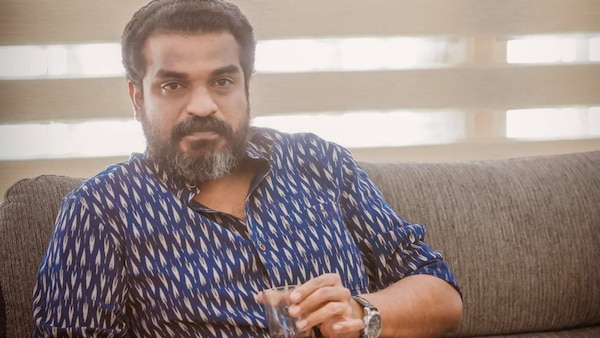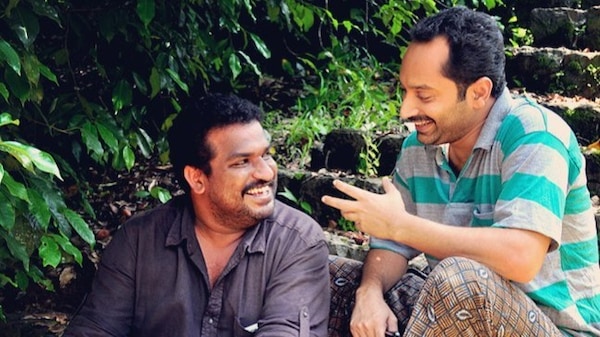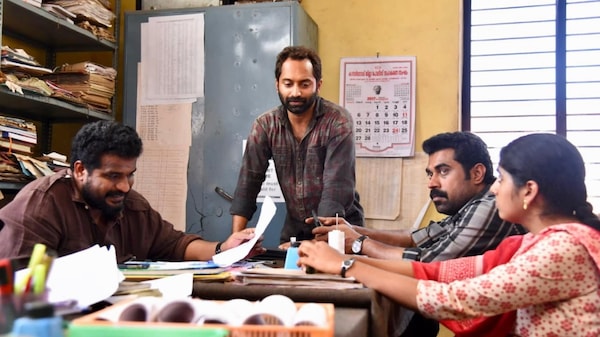Exclusive! Dileesh Pothan: Acting in my contemporaries’ films has helped me learn, update myself as a director
The Joji director, who is also part of Amal Neerad’s Bheeshma Parvam and Kamal KM’s Pada, tells us about his filmmaking process and why he hasn’t worked with superstars yet

Dileesh Pothan | Credit: Shijin P Raj
Last Updated: 07.35 PM, Mar 10, 2022
Dileesh Pothan has been hailed as a filmmaker who could do no wrong. As yet, he has helmed three movies – Maheshinte Prathikaaram , Thondimuthalum Driksakshiyum and Joji – and all of them have found a place in the must-watch Mollywood movies lists online ever since Malayalam cinema gained a pan-Indian following during the pandemic.
But he’s not just honing his filmmaking with each movie, Dileesh has also been a pivotal part of several acclaimed movies in the past year including Mahesh Narayanan’s Malik and Amal Neerad’s Bheeshma Parvam, most recently. Up next, he will be seen in Kamal KM’s socio-political thriller Pada , in which he plays a member of Ayyankali Pada along with Kunchacko Boban, Joju George and Vinayakan.
In a candid chat with OTTplay, the actor-filmmaker talks to us about what he loves about acting, the difference in making films for OTTs and theatre, and why he hasn’t worked with superstars yet.
You play a pivotal character in Pada. It’s a film that is politically relevant. When you agree to be part of such films, do you also consider your political stance?
I take into account what the film is trying to convey, and if it has to be told. That’s a huge deciding factor in me signing any movie. The film’s politics does attract me as an individual as well as a filmmaker.
As a filmmaker who also acts, you work with a lot of directors. Do you also try to learn from the filmmakers whom you collaborate with as an actor?
Yes, because you are experiencing a new way of filmmaking while working with them. It’s only because I am an actor that I have the advantage of closely watching Sathyan Anthikad or Ranjan Pramod direct their films.
Once while I had met Chemban Vinod Jose, I told him that I wanted to come to the sets of Lijo Jose Pellissery’s film to observe how he works with his actors and executes his scenes. So, we are all curious about how our contemporaries approach their craft. When Lijo called for Ee.Ma.Yau, it gave me a chance to experience that. So, acting has helped me learn and update myself as a director.
You have worked with scriptwriters Syam Pushkaran and Sajeev Pazhoor for your directorials. Do you have plans of scripting your own film?
I am not thinking about that. I might write for another director but not myself. When I am making a film, I like it when there is another scriptwriter because I am someone who likes the process of discussing with my writers while shaping up the film.
Joji was a movie that was made for OTTs. In terms of conceiving a project for that platform, what were the necessary changes that you had to bring in?
A creator is always aware of the platform where his artform is showcased. There’s a huge difference when you watch a movie in a theatre that is equipped with state-of-the-art sound systems and on a big screen with a large audience, compared to seeing the film with less than 10 people in the confines of your own house. So, I factored that in. Also, because Joji was made for OTT, it was not shot in cinemascope and was filmed in a format that suited the medium. It had to be a more personal experience, because that’s how people would be watching it and we had those discussions while making the film. But that’s about it.
Did your theatre background help in the process?
Absolutely. There were several stages while making the film. I believe my theatre background played a huge part in us arriving at the idea of Joji, which was inspired by McBeth. The movie was shot while the pandemic restrictions were in place, and so we had the notion that it had to be set in a restrictive environment. That’s how we zeroed in on plays, because in theatre, due to the limitation of space, the story is told in just a span of 3-4 scenes. A play is predominantly narrated through its characters and the atmosphere it creates. That’s the possibility we have explored in the making of Joji.
Majority of the movies that came out during the time on OTTs were chamber films. But Joji won a lot of attention because of its pacing. Again, did the platform have an influence on that?
Yes, I believe the film’s pacing and presentation would be different if it is made specifically for OTT platforms. For instance, you take into account that people could be watching the film on a 4K projection screen. All of this influences the film, from its scriptwriting to its editing. When a person buys a ticket to watch a film in a theatre, you are more or less guaranteed that they will watch it till the end because they have made time and come to the cinema hall just to see the movie. But on OTTs, if you can’t hook the audience within the first 15-20 minutes, they might skip to the next film. So, we have to keep all of this into account.

As a filmmaker, do you prefer doing such a movie with limited variables to control or a theatrical film?
I don’t really have a preference. I find joy when I find an idea and decide to make a film out of it. For me, the possibilities of that idea are what matter most. So, I am looking to pitch the idea and weave a plot out of that first. When that story takes form, you organically know which platform would be ideal for that film.
How do you go about casting your characters? Be it Fahadh Faasil in Maheshinte Prathikaaram or Nimisha Sajayan in Thondimuthalum Driksakshiyum, they had an element of surprise or unpredictability to them.
When I cast for a character, I have always believed that a particular actor’s image is often a burden. It’s because I am aware that when an actor is part of the film, it also brings along the preconceived notions of the audience about his or her character based on their previous films. I don’t want that, and so even for minor characters, I try to bring in new people. If the character is closer to the image that an actor already has, then it would be hard to penetrate the story because it would remind the audience of the films that they were part of. If the situation is reversed, then I cast prominent actors.

Is this also why you haven’t worked with the superstars of Malayalam cinema?
I also want to do films with our superstars. But if the characters don’t break their current image, then as a filmmaker, it personally wouldn't excite me. It’s not about doing a movie with them for namesake. When you get to work with them, you want to explore the possibilities of what you can do with them. Otherwise, you are just wasting their dates.
Who are the filmmakers whose works have influenced you the most?
I grew up watching Sathyan Anthikad and Priyadarshan’s films. Their movies are the ones that urged me to watch films repeatedly and learn more about cinema. Even the films written by Raghunath Paleri. I started watching KG George and Adoor Gopalakrishnan’s films much later. To be honest, I think all good films have influenced me to an extent. I don’t have a role model per se.
What are your upcoming projects?
I have Prakashan Parakkatte coming up. I am also part of Ranjan Pramod’s O Baby. I am playing a politician again in CBI 5: The Brain. As an actor, it’s becoming a challenge now to not be stereotyped because eight out of 10 offers that come my way have me either as a politician or a cop.
Subscribe to our newsletter for top content, delivered fast.

